- Home
- Conn Iggulden
Stormbird wotr-1 Page 2
Stormbird wotr-1 Read online
Page 2
‘That’s what the boy said to me,’ Derry replied. ‘ “Bring me a truce, Derry,” he says. “Bring me peace.” Peace when we could take it all with one good season of fighting. It turned my stomach — and his poor old dad must be turning in his grave. I’ve spent more time in the archives than any man with red blood should ever be asked to do. But I found it, William Pole. I found something the French won’t turn down. You’ll take it to them and they’ll fret and worry, but they won’t be able to resist. He’ll get his truce.’
‘And will you share this revelation?’ Suffolk asked, holding his temper with difficulty. The man was infuriating, but Derry would not be rushed and there was still the suspicion that the spymaster enjoyed having an earl wait on his word. Suffolk resolved not to give Derry the satisfaction of showing impatience. He crossed the room to pour himself a cup of water from a jug, draining it in quick swallows.
‘Our Henry wants a wife,’ Derry replied. ‘They’d see hell freeze before they give him a royal princess like they did with his father. No, the French king will keep his daughters close by for Frenchmen, so I won’t even give him the pleasure of turning us down. But there is one other house, William — Anjou. The duke there has paper claims to Naples, Sicily and Jerusalem. Old René calls himself a king and he’s ruined his family trying to claim his rights for ten years now. He’s paid ransoms greater than you or I will ever see, William. And he has two daughters, one of them unpromised and thirteen.’
Suffolk shook his head, refilling the cup. He had sworn off wine and beer, but this was one time when he truly missed the stuff.
‘I know Duke René of Anjou,’ he said. ‘He hates the English. His mother was a great friend of that girl, Joan of Arc — and you’ll recall, Derry, that we burned her.’
‘No more than right,’ Derry snapped. ‘You were there, you saw her. That little bitch was in league with someone, even if it wasn’t the devil himself. No, you’re not seeing it, William. René has the ear of his king. That French peacock owes René of Anjou his crown, everything. Didn’t René’s mother give him sanctuary when he tucked up his skirts and ran? Didn’t she send little Joan of Arc to Orléans to shame them into attacking? That family kept France in French hands, or at least the arse end of it. Anjou is the key to the whole lock, William. The French king married René’s sister, for Christ’s sake! That’s the family that can put pressure on their little royal — and they’re the ones with an unmarried daughter. They are the way in, I’m telling you. I’ve looked at them all, William, every French “lord” with three pigs and two servants. Margaret of Anjou is a princess; her father beggared himself to prove it.’
Suffolk sighed. It was late and he was weary.
‘Derry, it’s no good, even if you’re right. I’ve met the duke more than once. I remember him complaining to me that English soldiers laughed at his order of chivalry. He was most offended, I recall.’
‘He should not have called it the Order of the Croissant, then, should he?’
‘It’s no stranger than the Order of the Garter, is it? Either way, Derry, he won’t give us a daughter, certainly not in exchange for a truce. He might take a fortune for her, if things are as bad as you say, but a truce? They aren’t all fools, Derry. We haven’t had a campaign for a decade and every year it gets just a little harder to hold the land we have. They have an ambassador here and I’m sure he tells them everything he sees.’
‘He tells them what I let him see; don’t you worry about that. I have that perfumed boy sewn up tight. But I haven’t told you what we’ll offer to make old René sweat and pull on his king’s sleeve, just begging his monarch to accept our terms. He’s poor as a blind archer without the rents from his ancestral lands. And why is that? Because we own them. He has a couple of derelict old castles that look out on the best farmland in France, with good Englishmen and soldiers enjoying it for him. Maine and Anjou entire, William. That will bring him to the table fast enough. That will win us our truce. Ten years? We’ll demand twenty and a bloody princess. And René of Anjou has the king’s ear. The snail-eaters will fall over themselves to say yes.’
Suffolk rubbed his eyes in frustration. He could feel the taste of wine in his mouth, though he had not touched a drop for more than a year.
‘This is madness. You’d have me give away a quarter of our land in France?’
‘You think I like it, William?’ Derry demanded angrily. ‘You think I haven’t sweated for months looking for a better path? The king said “Bring me a truce, Derry” — well, this is it. This is the only thing that will do it and, believe me, if there was another way, I’d have found it by now. If he could use his father’s sword — Christ, if he could even lift it — I wouldn’t be having this conversation with you. You and I would be out once more, with the horns blowing and the French on the run. If he can’t do that — and he can’t, William, you’ve seen him — then this is the only way to peace. We’ll find him a wife as well, to conceal the rest.’
‘Have you told the king?’ Suffolk asked, already knowing the answer.
‘If I had, he’d agree, wouldn’t he?’ Derry replied bitterly. ‘ “You know best, Derry,” “If you think so, Derry.” You know how he talks. I could get him to say yes to anything. Trouble is, so can anyone else. He’s weak like that, William. All we can do is get him a wife, bide our time and wait for a strong son.’ He saw Suffolk’s dubious expression and he snorted. ‘It worked for Edward, didn’t it? The Hammer of the bloody Scots had a weak son, but his grandson? I wish I’d known a king like that. No, I did know a king like that. I knew Harry. I knew the lion of bloody Agincourt, and maybe that’s all a man can hope for in one lifetime. But while we wait for a proper monarch, we have to have a truce. The beardless boy isn’t up to anything else.’
‘Have you even seen a picture of this princess?’ Suffolk asked, staring off into the distance.
Derry laughed scornfully.
‘Margaret? You like them young, do you? And you a married man, William Pole! What does it matter what she looks like? She’s almost fourteen and a virgin; that’s all that matters. She could be covered in warts and moles and our Henry would say “If you think I should, Derry,” and that’s the truth of it.’
Derry came to stand at Suffolk’s shoulder, noting to himself how the older man seemed more bowed down than he had when he’d entered.
‘They know you in France, William. They knew your father and your brother — and they know your family has paid its dues. They’ll listen to you, if you take this to them. We’ll still have the north and all the coast. We’ll still have Calais and Normandy, Picardy, Brittany — all the way to Paris. If we could hold all that and Maine and Anjou as well, I’d be raising the flags and marching with you. But we can’t.’
‘I’ll need to hear this from the king before I go back,’ Suffolk said, his eyes bleak.
Derry looked away uncomfortably.
‘All right, William. I understand. But you know … No, all right. You’ll find him in the chapel. Maybe you can interrupt his prayers, I don’t know. He’ll agree with me, William. He always bloody agrees.’
Across a swathe of frozen, crunching grass, the two men walked in darkness to the Windsor chapel, dedicated to the Blessed Virgin, Edward the Confessor and St George. In starlight, with his breath misting before him, Derry nodded to the guards at the outer door as they passed through into a candlelit interior that was almost as cold as the night outside.
The chapel seemed empty at first, though Suffolk sensed and then caught glimpses of men standing among the statues. In dark robes, they were almost invisible until they moved. Footsteps on stone echoed in the silence as the watchers walked towards the two men, faces hard with their responsibility. Twice, Derry had to wait until he was recognized before he could make his way along the nave towards the lone figure at prayer.
The monarch’s seat was almost enclosed in carved and gilded wood, lit by dim lamps hanging far above. Henry knelt there with his hands out in front of him, tight-clen
ched and rigid. His eyes were closed and Derry sighed softly to himself. For a time, he and Suffolk just stood and waited, gazing on the upraised face of a boy, lit gold in the darkness. The king looked angelic, but it broke both their hearts to see how young he seemed, how frail. It was said his birth had been a trial for his French mother. She had been lucky to survive and the boy had been born blue and choking. Nine months later and his father, Henry V, was dead, torn from life by simple sickness after surviving a lifetime of war. There were some who said it was a blessing that the battle king had not lived to see his son become a man.
In the gloom, Derry and Suffolk looked at each other in silence, sharing the same sense of loss. Derry leaned close.
‘It could be hours yet,’ he whispered into Suffolk’s ear. ‘You’ll have to interrupt or we’ll be here till morning.’
In response, Suffolk cleared his throat, the sound louder than he had intended in the echoing silence. The king’s eyes fluttered open, as if he was returning from very far away. Slowly, Henry turned his head, taking in the two men standing there. He blinked, then smiled at them both, crossing himself and muttering a final prayer before rising on legs made stiff from hours of stillness.
Suffolk watched his king fumble with the latch of the monarch’s seat before stepping down and approaching him. Henry left the pool of light behind, so that they could not see his face as he came close.
Both men knelt, Suffolk’s knees protesting. Henry chuckled over their bowed heads.
‘My heart is full to see you, Lord Suffolk. Come now, stand up. The floor is too cold for old men. I’m sure that’s right. I hear my chambermaid complaining, though she doesn’t know I’m there. She’s younger than you, I think. Up, both of you, before you catch a chill.’
As Derry stood, he opened the lamp he carried, spreading light across the chapel. The king was dressed in the simplest of clothes, just plain dark wool and blunt leather shoes like any townsman. He wore no gold and, with the look of a boy, he might have been an apprentice in some trade that did not require too much strength.
Suffolk searched the young man’s face for some trace of the father, but the eyes were guileless and the frame was slender, showing no sign of the massive strength of his bloodline. Suffolk almost missed the bandages on Henry’s hands. His gaze snagged on them and Henry held them up into the light, his face flushing.
‘Sword practice, Lord Suffolk. Old Marsden says they’ll harden, but they just bleed and bleed. I thought for a while …’ He caught himself, raising one bound finger to tap lightly at his mouth. ‘No, you have not come from France to see my hands. Have you?’
‘No, Your Grace,’ Suffolk answered gently. ‘Can you grant me a moment? I have been talking to Master Brewer about the future.’
‘No beer from Derry!’ Henry said. ‘The only Master Brewer with no beer!’
It was an old jest, but both the older men chuckled dutifully. Henry beamed at them.
‘In truth, I cannot go from this place. I am allowed to take a break each hour, for water or to fill a pot, but then I must return to my prayers. Cardinal Beaufort told me the secret and the burden is not too great.’
‘The secret, Your Grace?’
‘That the French can’t come while a king prays, Lord Suffolk! With my hands, even bandaged as they are, I hold them back. Isn’t that a wonderful thing?’
Suffolk breathed slowly in and out, silently cursing the young man’s great-uncle for his foolishness. There was no purpose in having Henry waste his nights in such a way, though Suffolk imagined it made it easier for those around him. Somewhere nearby, Cardinal Beaufort would be sleeping. Suffolk resolved to wake him up and have him join the boy in prayers. A king’s prayers could only be gilded by those of a cardinal, after all.
Derry had been listening closely, waiting to speak.
‘I’ll clear the men away, my lord Suffolk. Your Grace, with your permission? This is a private matter, best not overheard.’
Henry gestured for him to carry on while Suffolk smiled at the formal tone. For all Derry’s bitterness and scorn, he was cautious in the presence of the king. There would be no blasphemy in that chapel, not from him.
The king seemed not to notice the half-dozen men Derry ushered out of the chapel into the frozen night. Suffolk was cynical enough to suspect one or two remained in the darkest alcoves, but Derry knew his own men and Henry’s patience was already wearing thin, his gaze drifting back to his place of prayer.
Suffolk felt a surge of affection for the young king. He had watched Henry grow with the hopes of an entire country on his shoulders. Suffolk had seen those hopes falter and then crumble into disappointment. He could only guess how hard it had been for the boy himself. Henry was not stupid, for all his strangeness. He would have heard every barbed comment made about him over the years.
‘Your Grace, Master Brewer has vouchsafed a plan to bargain for a wife and a truce together, in exchange for two great provinces of France. He believes the French will deliver a truce in exchange for Maine and Anjou.’
‘A wife?’ Henry said, blinking.
‘Yes, Your Grace, as the family in question has a suitable daughter. I wanted …’ Suffolk hesitated. He could not ask whether the king understood what he was saying. ‘Your Grace, there are English subjects living in both Maine and Anjou. They would be evicted if we give them up. I wanted to ask if it isn’t too high a price to pay for a truce.’
‘We must have a truce, Lord Suffolk. We must. My uncle the cardinal says so. Master Brewer agrees with him — though he has no beer! Tell me of the wife, though. Is there a picture?’
Suffolk closed his eyes for an instant before opening them.
‘I will have one made, Your Grace. The truce, though. Maine and Anjou are the southern quarter of our lands in France. Together, they are as great as Wales, Your Grace. If we give such a tract of land away …’
‘What is her name, this girl? I cannot call her “girl” or even “wife”, now can I, Lord Suffolk?’
‘No, Your Grace. Her name is Margaret. Margaret of Anjou.’
‘You will go to France, Lord Suffolk, and you will see her for me. When you return, I shall want to hear every detail.’
Suffolk hid his frustration.
‘Your Grace, do I have it right that you are willing to lose lands in France for peace?’
To his surprise, the king leaned in close to reply, his pale blue eyes gleaming.
‘As you say, Lord Suffolk. We must have a truce. I depend on you to carry out my wishes. Bring me a picture of her.’
Derry had returned while the conversation went on, his face carefully blank.
‘I’m sure His Royal Highness would like to return to his prayers now, Lord Suffolk.’
‘I would, yes,’ Henry replied, holding up one bandaged hand in farewell. Suffolk could see a dark red stain at the centre of the palm.
They bowed deeply to the young king of England as he walked back to his place and knelt, his eyes closing slowly, his fingers lacing together like a lock.
2
Margaret let out a gasp as a hurrying figure thumped into her and they both went sprawling. She had a blurred sense of tight-drawn brown hair and a smell of healthy sweat and then she went down with a yelp. A copper pot crashed to the courtyard stones with a noise so great it hurt her ears. As Margaret fell, the maid flailed to catch the pot, but only sent it spinning.
The maid looked up angrily, her mouth opening on a curse. As she saw Margaret’s fine red dress and billowing white sleeves, the blood drained from her face, stealing away the flush from the kitchens. For an instant, her eyes flickered to the path, considering whether she could run. With so many strange faces in the castle, there was at least a chance the girl wouldn’t recognize her again.
With a sigh, the maid wiped her hands on an apron. The kitchen mistress had warned her about the brothers and the father, but she’d said the youngest girl was a sweet little thing. She reached down to help Margaret to her feet.
�
��I’m sorry about that, dear. I shouldn’t have been running, but it’s all a rush today. Are you hurt?’
‘No, I don’t think so,’ Margaret replied dubiously. Her side ached and she thought she had scraped an elbow, but the woman was already shifting from foot to foot, wanting to be off. Back on her feet, Margaret smiled at her, seeing the gleam of sweat on the young woman’s face.
‘My name is Margaret,’ she said, remembering her lessons. ‘May I know your name?’
‘Simone, my lady. But I must get back to the kitchens. There’s a thousand things to do still, with the king coming.’
Margaret saw the handle of the pot sticking out of the trimmed hedge by her foot and picked it up. To her pleasure, the woman curtsied as she took it back. They shared a smile before the maid vanished at only a fraction less than her original speed. Margaret was left alone to stare after her. Saumur Castle had not been this busy for years and she could hear her father’s deep voice raised somewhere nearby. If he saw her, he would put her to work, she was certain, so she headed in the opposite direction.
Her father’s sudden return to Saumur had brought Margaret to bitter, furious tears more than once. She resented him as she would have resented any stranger who arrived with such airs, assuming all his rights as lord and master of her home. Over the decade of his absence, her mother had spoken often of his great bravery and honour, but Margaret had seen the blank spaces on yellowing plaster as paintings and statues were quietly taken and sold. The collection of jewellery had been the last to go and she’d observed her mother’s pain as men from Paris arrived to appraise the best pieces, staring through their little tubes and counting out coins. Every year had brought fewer luxuries and comforts, until Saumur was stripped of anything beautiful, revealed in cold stones. Margaret had grown to hate her father by then, without knowing him at all. Even the servants had been dismissed one by one, with whole sections of the castle closed and left to grow blue with mildew.

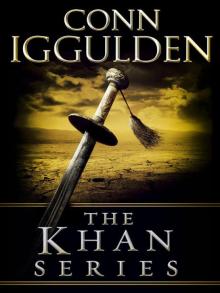 The Khan Series 5-Book Bundle
The Khan Series 5-Book Bundle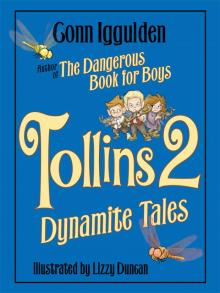 Tollins 2: Dynamite Tales
Tollins 2: Dynamite Tales Tollins: Explosive Tales for Children
Tollins: Explosive Tales for Children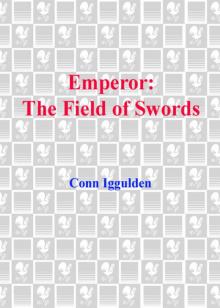 The Field of Swords
The Field of Swords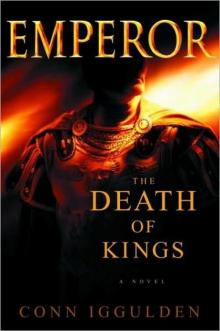 The Death of Kings
The Death of Kings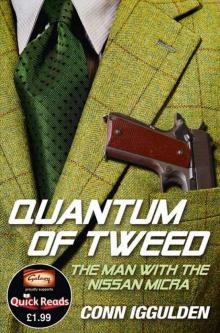 Quantum of Tweed: The Man With the Nissan Micra
Quantum of Tweed: The Man With the Nissan Micra Bones of the Hills
Bones of the Hills Genghis: Birth of an Empire
Genghis: Birth of an Empire The Gates of Rome
The Gates of Rome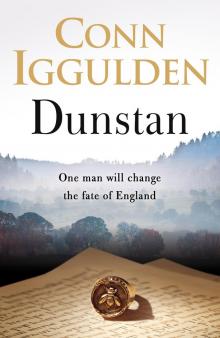 Dunstan
Dunstan Fig Tree
Fig Tree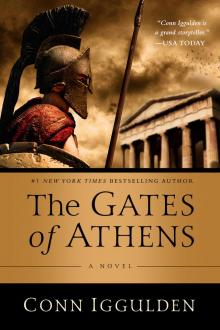 The Gates of Athens
The Gates of Athens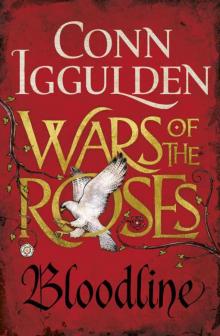 Stormbird
Stormbird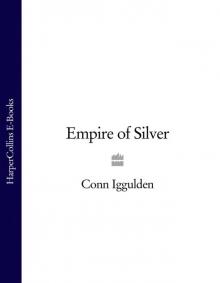 Khan: Empire of Silver
Khan: Empire of Silver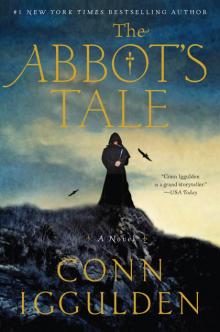 The Abbot's Tale
The Abbot's Tale Gengis: Lords of the Bow
Gengis: Lords of the Bow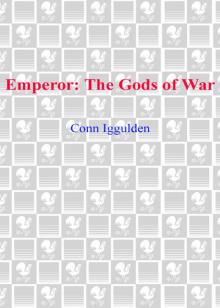 The Gods of War
The Gods of War Blackwater
Blackwater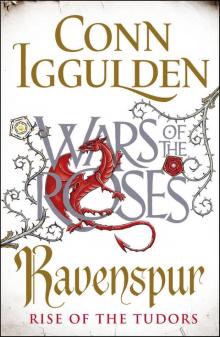 Ravenspur: Rise of the Tudors
Ravenspur: Rise of the Tudors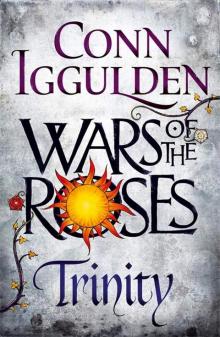 Wars of the Roses: Trinity (War of the Roses Book 2)
Wars of the Roses: Trinity (War of the Roses Book 2) The Gods of war e-4
The Gods of war e-4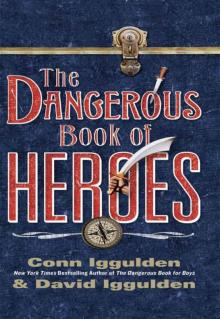 The Dangerous Book of Heroes
The Dangerous Book of Heroes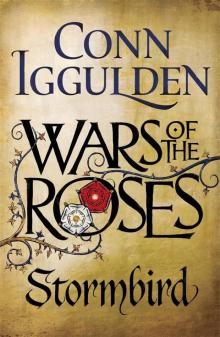 Stormbird wotr-1
Stormbird wotr-1 Emperor: The Death of Kings
Emperor: The Death of Kings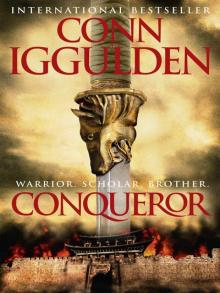 Conqueror (2011) c-5
Conqueror (2011) c-5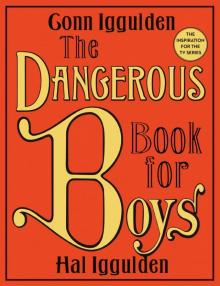 The Dangerous Book for Boys
The Dangerous Book for Boys Genghis Lords of the Bow
Genghis Lords of the Bow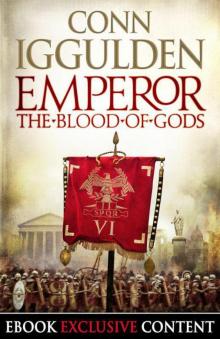 Emperor: The Blood of Gods (Special Edition) (Emperor Series, Book 5)
Emperor: The Blood of Gods (Special Edition) (Emperor Series, Book 5)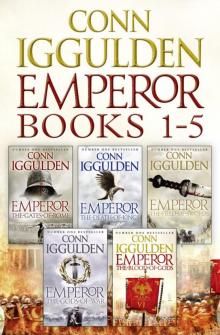 The Emperor Series: Books 1-5
The Emperor Series: Books 1-5 Lords of the Bow c-2
Lords of the Bow c-2 Lords of the Bow
Lords of the Bow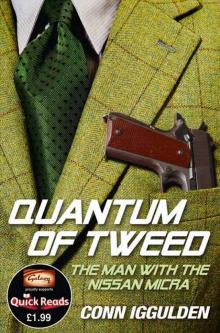 Quantum of Tweed
Quantum of Tweed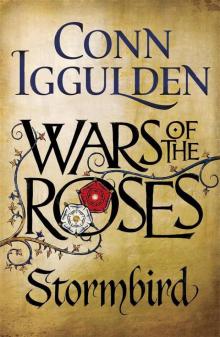 Wars of the Roses 01 - Stormbird
Wars of the Roses 01 - Stormbird Empire of Silver c-4
Empire of Silver c-4 Birth of an Empire
Birth of an Empire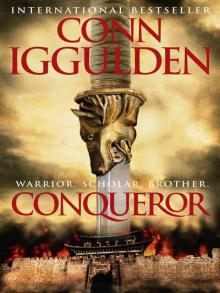 Conqueror (2011)
Conqueror (2011)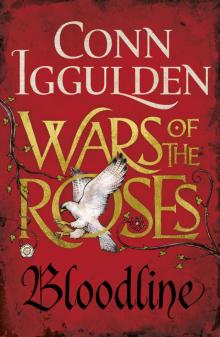 Wars of the Roses: Bloodline: Book 3 (The Wars of the Roses)
Wars of the Roses: Bloodline: Book 3 (The Wars of the Roses) Bones Of the Hills c-3
Bones Of the Hills c-3 Empire of Silver
Empire of Silver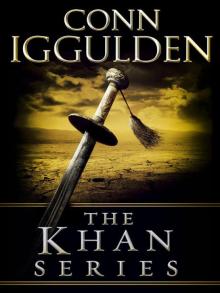 The Khan Series 5-Book Bundle: Genghis: Birth of an Empire, Genghis: Bones of the Hills, Genghis: Lords of the Bow, Khan: Empire of Silver, Conqueror
The Khan Series 5-Book Bundle: Genghis: Birth of an Empire, Genghis: Bones of the Hills, Genghis: Lords of the Bow, Khan: Empire of Silver, Conqueror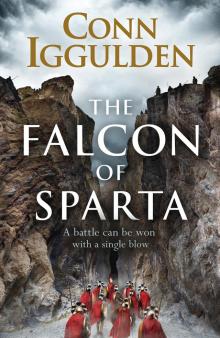 The Falcon of Sparta
The Falcon of Sparta Explosive Tales for Children
Explosive Tales for Children